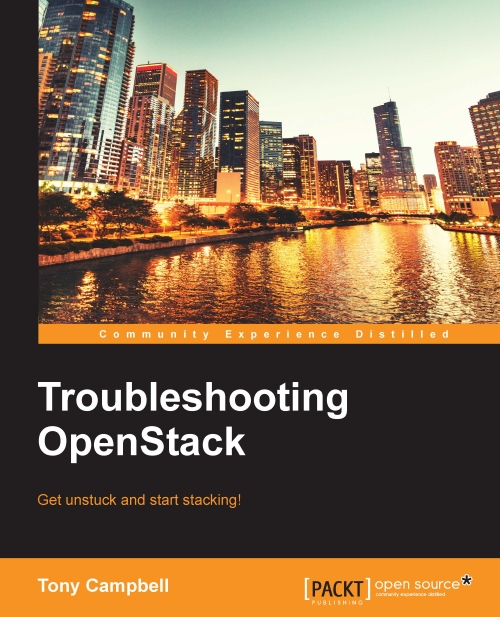Rackspace’s director of training and certification Tony Campbell has guided hundreds of people through the wilds of learning OpenStack.
He’s got a new book out titled "Troubleshooting OpenStack" from Packt publishing, available as a 170-page paperback or eBook. If you’re coming to the OpenStack Austin Summit, Campbell tells us to look for it as a giveaway, too.
Superuser asked him about where most newcomers get stuck and why all of OpenStack is a stage.

Who will this help most?
This book is targeted towards experienced system administrators who are new to OpenStack. Individuals who are in the process of deploying OpenStack for evaluation or test, and are running into problems, will benefit from this book.
As Rackspace’s director of training and certification, how many people would you estimate you introduced to OpenStack?
Wow. We were the first to offer OpenStack Training and in the early days I delivered all the training assisted by our developers and engineers. I’ve probably introduced hundreds personally and thousands indirectly through our team.
What’s the most common stumbling block for newcomers?
Understanding how all the projects work together is probably one of the biggest stumbling blocks. OpenStack is powerful, but it can also appear complex to the uninitiated. Wrapping your mind around all the integration points can be challenging, particularly if you try to do it on your own.
Just finished tech-editing on @tonyontopic's book on #OpenStack Troubleshooting. Looking forward to the proper release.
— Cody Bunch – Happy flower man (@cody_bunch) February 3, 2016
The book’s subtitle is about getting “unstuck, ” what are some of the sticking points along the journey?
OpenStack moves fast. When troubleshooting, it can be difficult to find the correct information for your particular version or deployment. There is a lot of advice and information available out there, but you have to make sure it pertains to your deployment and environment. I see a lot of people get stuck as they try to sift through all the information and tips.
What’s the biggest thing the OpenStack community might work on to make things easier?
I think the community is doing a ton to make things easier. The fact that documentation has always been a first-class citizen is a prime example. I also think the ask.openstack.org is a great resource.
Areas where I think we can improve include the introducing a “newcomers” track at the Summit, with a prescribed set of courses and seminars for folks new to OpenStack. I’d also like to see a way to curate all the OpenStack information out there and make sure it is tagged with the OpenStack release it refers to, but that might be a fantasy.
What’s the role of a book when there are more training programs now than ever?
I believe in leverage multiple methods of learning. Documentation, training and books are just examples of potential methods. The nice thing about books is that the reader can work through the material at their own pace. Our classes are time boxed but our books are not. Books also allow readers to follow their own path, they can skip around the book as necessary to find the information they are looking for.
What’s on your OpenStack bookshelf?
The OpenStack Docs. I’m a big fan!
The OpenStack Wiki. There are some hidden treasures in that content.
The OpenStack source code. One of the reasons I love open source is because it’s all there.
Okay, now for the books. Many of my fellow Rackers have written on OpenStack and I love reading their work.
Learning OpenStack Networking – James Denton
OpenStack Cloud Computing Cookbook – Kevin Jackson, Cody Bunch and Egle Sigle
OpenStack Administration with Ansible – Walter Bentley
I’m also a fan of the crew at SwiftStack and their book
Object Storage with Swift – Joe Arnold
Your bio mentions that you perform in amateur theater – if OpenStack were a production, what would it be? What role would you claim?
Haha..Yes, I’ve done professional theater in Silicon Valley, shout out to TheatreWorks – Silicon Valley. If OpenStack were a production it would definitely be a musical. There are so many moving parts to a musical; choreography, music, orchestra, acting, set pieces, lights, etc. It reminds me of OpenStack because so many teams have to work in unison to pull it off.
What role would I play? I would be the dramaturge. In theater, this individual works with authors and directors. They research and possible adapt scripts in preparation for production. The dramaturges I’ve worked with in the past helped the actors to understand the play and the context that it is set in. That’s exactly what I get to do for OpenStack.
Any book giveways or promotions?
There will be book giveaways at the Austin Summit. Several of my colleagues will be there with their books, including Walter Bentley’s on Ansible. Follow me at @TonyOnTopic for details about future giveaways.
- Exploring the Open Infrastructure Blueprint: Huawei Dual Engine - September 25, 2024
- Open Infrastructure Blueprint: Atmosphere Deep Dive - September 18, 2024
- Datacomm’s Success Story: Launching A New Data Center Seamlessly With FishOS - September 12, 2024

)







